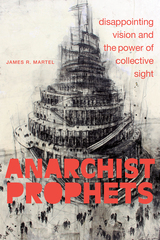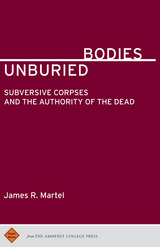3 books about Martel, James R.

Anarchist Prophets
Disappointing Vision and the Power of Collective Sight
James R. Martel
Duke University Press, 2022
In Anarchist Prophets James R. Martel juxtaposes anarchism with what he calls archism in order to theorize the potential for a radical democratic politics. He shows how archism—a centralized and hierarchical political form that is a secularization of ancient Greek and Hebrew prophetic traditions—dominates contemporary politics through a prophet’s promises of peace and prosperity or the threat of violence. Archism is met by anarchism, in which a community shares a collective form of judgment and vision. Martel focuses on the figure of the anarchist prophet, who leads efforts to regain the authority for the community that archism has stolen. The goal of anarchist prophets is to render themselves obsolete and to cede power back to the collective so as to not become archist themselves. Martel locates anarchist prophets in a range of philosophical, literary, and historical examples, from Hobbes and Nietzsche to Mary Shelley and Octavia Butler to Kurdish resistance in Syria and the Spanish Revolution. In so doing, Martel highlights how anarchist forms of collective vision and action can provide the means to overthrow archist authority.
[more]

The Misinterpellated Subject
James R. Martel
Duke University Press, 2017
Although Haitian revolutionaries were not the intended audience for the Declaration of the Rights of Man, they heeded its call, demanding rights that were not meant for them. This failure of the French state to address only its desired subjects is an example of the phenomenon James R. Martel labels "misinterpellation." Complicating Althusser's famous theory, Martel explores the ways that such failures hold the potential for radical and anarchist action. In addition to the Haitian Revolution, Martel shows how the revolutionary responses by activists and anticolonial leaders to Woodrow Wilson's Fourteen Points speech and the Arab Spring sprang from misinterpellation. He also takes up misinterpellated subjects in philosophy, film, literature, and nonfiction, analyzing works by Nietzsche, Kafka, Woolf, Fanon, Ellison, Ta-Nehisi Coates, and others to demonstrate how characters who exist on the margins offer a generally unrecognized anarchist form of power and resistance. Timely and broad in scope, The Misinterpellated Subject reveals how calls by authority are inherently vulnerable to radical possibilities, thereby suggesting that all people at all times are filled with revolutionary potential.
[more]

Unburied Bodies
Subversive Corpses and the Authority of the Dead
James R. Martel
Amherst College Press, 2018
The human body is the locus of meaning, personhood, and our sense of the possibility of sanctity. The desecration of the human corpse is a matter of universal revulsion, taboo in virtually all human cultures. Not least for this reason, the unburied corpse quickly becomes a focal point of political salience, on the one hand seeming to express the contempt of state power toward the basic claims of human dignity—while on the other hand simultaneously bringing into question the very legitimacy of that power. In Unburied Bodies: Subversive Corpses and the Authority of the Dead, James Martel surveys the power of the body left unburied to motivate resistance, to bring forth a radically new form of agency, and to undercut the authority claims made by state power. Ranging across time and space from the battlefields of ancient Thebes to the streets of Ferguson, Missouri, and taking in perspectives from such writers as Sophocles, Machiavelli, Walter Benjamin, Hannah Arendt, James Baldwin, Judith Butler, Thomas Lacqueur, and Bonnie Honig, Martel asks why the presence of the abandoned corpse can be seen by both authorities and protesters as a source of power, and how those who have been abandoned or marginalized by structures of authority can find in a lifeless body fellow accomplices in their aspirations for dignity and humanity.
[more]
READERS
Browse our collection.
PUBLISHERS
See BiblioVault's publisher services.
STUDENT SERVICES
Files for college accessibility offices.
UChicago Accessibility Resources
home | accessibility | search | about | contact us
BiblioVault ® 2001 - 2025
The University of Chicago Press









